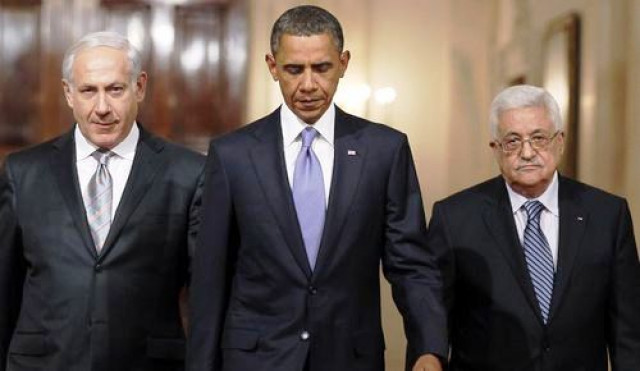I can’t blame them for trying, but when it comes to a real and lasting Middle East peace agreement, the Israelis and the Palestinians are as far apart as they have ever been.
On September 2, they gave it another shot in Washington DC. On television it all looked very good to the average American, you had the Israeli prime minister Benjamin Netanhayu and Palestinian authority president Mahmoud Abbas at the same table for the first time in years.
They were joined by US president Barack Obama and two of the Middle East’s most influential power brokers; Egyptian President Hosni Mubarak and Jordan’s King Abdullah.
It was like a Broadway play, put on by the same person who produced the Middle East peace summit at Camp David in July 2000.
Remember that? Oh yeah, nothing was accomplished.
Bill Clinton blamed Yasser Arafat, Arafat blamed Ehud Barak and there were also couple of books about whose fault it was.
Believe or not, Camp David was easy compared to the current meeting. Today the Israelis have to try to negotiate with 2 Palestinian groups, the Palestinian Authority that controls the West Bank and Hamas which controls Gaza.
If you don’t understand most of this don’t feel bad. I have worked as a journalist in the region, in Gaza, Israel and Lebanon, and explaining the problem and figuring out a solution is like trying to eat soup with a fork.
Here is the scorecard that explains the stalemate: the Israelis and Americans have finally accepted that the only route to peace is giving the Palestinians a state of their own.
Whoever cooked up the idea that millions of displaced Palestinians would live under occupation or sit in refugee camps forever was not very smart or humane.
But the two sides cannot agree on what a future Palestinian state would look like, It would be in the West Bank and the Gaza strip, but some of the land in the west bank is occupied by illegal Israeli settlers.
The Israeli government would have to remove these settlers like the Gaza pullout in 2005, and this is not going to happen, at least not on Netanyahu’s watch.
If it ever did the Israeli’s would need assurances that they would have security. How would they be able to secure their borders? Remember – Israelis and Palestinians trust each other as much as Indians and Pakistanis.
Another issue is Jerusalem. If you ever travel there you will see that the old city is home to some of the most sacred religious sites for Jews, Muslims and Christians. For Jews it is the western wall at the foot of the Temple Mount, for Muslims it is the golden mosque and for Christians it is the Christian quarter. Palestinians want Jerusalem to be the capitol of their future state, but there is little or no chance that Israelis would give this up.
The other area that would be part of a future Palestinian state is the Gaza strip. As if things could not get more complicated, the elected leadership in Gaza is Hamas.
Hamas is a faction backed by Syria and Iran and is sworn to the destruction of Israel. Hamas fighters have fired more than one thousand rockets into southern Israel that led to a devastating war in December of 2008, and they don’t exactly get along with the Palestinian authority either.
A representative from Hamas was not in Washington and they are not part of the peace talks. How in the world can you have a peace deal without Hamas? They are like the kid in the neighborhood who nobody wants to play with, but they hold some very important cards. Someone has to figure out what to do about Hamas or these talks, like the previous ones, will fail.
The final major challenge is the right of return for millions of Palestinian refugees. When israel was established in 1948, many Palestinians were forced to evacuate their property and move into refugee camps.
I recently met a Palestinian man in Burj el-Barajneh, one of more than a dozen Palestinian refugee camps in Lebanon. He narrated how he and his family were forced to evacuate from their home in 1948, he even showed me the key he had kept all these years, hoping that someday he can return home.
Sadly for this man and so many others their dream will most likely never be part of any deal, their only hope is that they will receive some sort of monetary compensation.
When Israeli president Shimon Peres picked Benjamin Netanyahu to form a government in February of 2009, I was in the Gaza strip and my colleague at al-Jazeera English Sami Zeidan asked me on air what the reaction was in Gaza city.
I said, ‘Sami, the more things change, the more they stay the same.’
The next round of talks are set for Monday in Sharm el-Sheik in Egypt and if I were there to cover the talks, I would say the same thing.
The more things change, the more they stay the same
When it comes to a real and lasting Middle East peace agreement, the Israelis and the Palestinians are as a far apart as they have ever been.



COMMENTS
Comments are moderated and generally will be posted if they are on-topic and not abusive.
For more information, please see our Comments FAQ